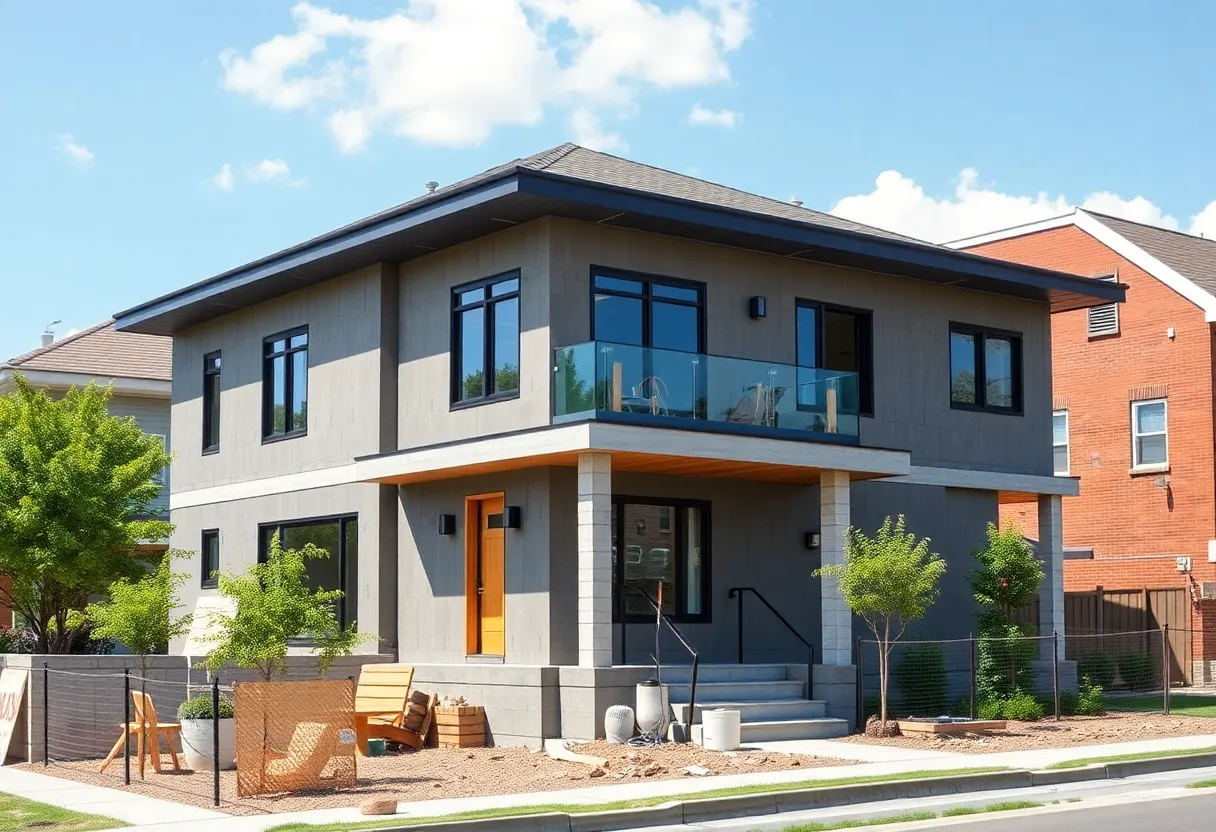How to Navigate Philadelphia’s Housing Market When Building Your New Home: Essential Insights for Buyers
Current Market Overview
The Philadelphia housing market in 2025 presents a complex landscape for prospective homebuilders. As of early 2025, the median home sale price in the Philadelphia metro area is approximately $416,000, reflecting a 4% year-over-year increase. This upward trajectory is primarily fueled by limited inventory and sustained demand across the city. The number of homes sold has decreased by 8.7% compared to the previous year, signaling heightened competition among buyers.
The market remains diverse, with neighborhoods experiencing varying price trends. Overall, Philadelphia continues to show resilience despite nationwide economic fluctuations, making it an environment of both challenges and opportunities for those planning to build new homes.
Key Considerations for Building a New Home
1. Financial Planning
Building a new home involves significant financial investment that surpasses the costs associated with purchasing existing properties. Elevated construction expenses, driven by labor shortages and rising material prices, must be factored into your budget. The current mortgage rates in Philadelphia are averaging between 6% and 7%. Such rates directly influence monthly payments, increasing long-term costs.
Securing financing suited to these conditions is vital. Prospective buyers should explore various options, including construction loans, and prepare for additional costs beyond initial estimates. Budgeting with contingency funds—generally 10-15% of projected costs—is recommended to address unforeseen expenses during construction.
2. Site Selection
Choosing the right location can significantly impact your property’s value and future resale potential. Neighborhoods like Fishtown, Northern Liberties, and Point Breeze have recorded median sale price increases of around 6% from the previous year. These areas have seen recent development momentum, attracting buyers and investors alike.
However, these neighborhoods also face intense competition and limited inventory. Early engagement in the site selection process is crucial. Consider factors such as proximity to amenities, urban development plans, and zoning restrictions, all of which influence both building feasibility and future value.
3. Navigating Zoning and Permitting
Philadelphia’s zoning laws can be complex and vary significantly by neighborhood. It is essential to consult with local zoning authorities before design and construction begins. Recent efforts to overhaul housing policies aim to promote affordable development, but regulatory adjustments can cause delays.
Obtaining necessary permits requires detailed documentation, including site plans, environmental considerations, and compliance with building codes. Engaging a knowledgeable architect or zoning expert can streamline this process, reducing the risk of compliance issues and project delays.
4. Managing Construction Costs
Construction costs have surged due to persistent labor shortages and material price hikes. It is critical to obtain detailed bids from reputable contractors and include allowances for escalation. Contingency planning is essential to guard against unforeseen expenses—unexpected issues during construction can add 10-20% to budget estimates.
In addition, project timelines should account for possible delays caused by permitting or supply chain disruptions. Regular cost tracking and transparent contractor communication are key to staying within budget.
5. Understanding Market Dynamics
Philadelphia’s real estate scene in 2025 is characterized by high demand and constrained supply. The city ranks among the top five hottest markets nationwide, with housing inventory increasing slightly by 5.5% from the previous year. This moderation indicates a gradually improving balance but does not reduce competition for desirable properties.
Market responsiveness—being prepared to act quickly when opportunities arise—is critical. Having your financing lined up and construction plans ready can make the difference in securing your ideal site before it’s gone.
Strategies for Success
1. Engage Local Professionals
Partnering with experienced local real estate agents, architects, and contractors provides strategic advantages. Their intimate knowledge of neighborhood trends, zoning regulations, and construction practices can help optimize your approach.
Working with professionals also facilitates smoother transactions and ensures compliance with city codes, reducing the risk of costly fines or project stalls.
2. Monitor Market Trends
Stay abreast of status updates in median sale prices, inventory levels, and development initiatives. This intelligence enables timely decisions—whether to accelerate your building schedule or adjust plans to align with market shifts. For example, noting price increases can inform budgeting and negotiations.
3. Prioritize Energy Efficiency
Energy-efficient features appeal to environmentally conscious buyers and reduce ongoing living expenses. Incorporating high-efficiency HVAC systems, insulation, solar panels, and smart home technology enhances long-term savings and resale appeal.
Philadelphia’s evolving market favors sustainable designs, aligning with city initiatives to promote green building practices.
4. Plan for Future Resale
While your focus is on building a dream home, consider features that bolster resale over time. Opt for durable, timeless materials and layouts that appeal to future buyers. Strategic updates like quality finishes and adaptable spaces can provide ongoing value.
Additional Considerations
Building Timeline and Flexibility
Construction timelines are subject to variability—permit processing delays and supply chain issues can extend schedules. Building with flexibility in mind allows adaptation to unforeseen circumstances, avoiding frustration and budget overruns.
Environmental and Community Impact
Modern projects benefit from sustainable practices that reduce environmental impact. Integrating green spaces, eco-friendly materials, and stormwater management solutions aligns with city priorities and can enhance neighborhood integration and approval processes.
Chart: Key Features of Navigating Philadelphia’s Housing Market in 2025
| Feature | Details |
|---|---|
| Median Home Price | $416,000 with +4% YoY increase |
| Mortgage Rates | Between 6% and 7% |
| Neighborhood Appreciation | Key areas like Fishtown, Northern Liberties, Point Breeze +6% |
| Inventory Change | +5.5% YoY, signaling gradual market balance |
| Construction Costs | Increased due to labor/material shortages; plan contingencies |
| Market Competition | High demand, limited supply necessitates swift action |
FAQ
What is the current median home sale price in Philadelphia?
As of early 2025, the median home sale price in Philadelphia is approximately $416,000, reflecting a 4% year-over-year rise. This indicates a competitive market environment.
How have construction costs changed recently in Philadelphia?
Construction expenses have increased due to labor shortages and material price hikes. Prospective builders should include contingencies and obtain detailed estimates before proceeding.
Which neighborhoods are experiencing significant appreciation?
Neighborhoods such as Fishtown, Northern Liberties, and Point Breeze have experienced median price increases of approximately 6% over the past year.
What are the current mortgage rates?
Mortgage rates in Philadelphia are averaging between 6% and 7%, impacting overall affordability and financing strategies.
How can I navigate zoning laws when building my home?
Consult with local zoning authorities early in the process. It’s important to understand regulations and acquire permits to avoid delays, especially with recent policy reforms aimed at promoting development.
Author: STAFF HERE PHILADELPHIA WRITER
The PHILADELPHIA STAFF WRITER represents the experienced team at HEREPhiladelphia.com, your go-to source for actionable local news and information in Philadelphia, Philadelphia County, and beyond. Specializing in "news you can use," we cover essential topics like product reviews for personal and business needs, local business directories, politics, real estate trends, neighborhood insights, and state news affecting the area—with deep expertise drawn from years of dedicated reporting and strong community input, including local press releases and business updates. We deliver top reporting on high-value events such as Mummers Parade, Philadelphia Flower Show, and Thanksgiving Day Parade. Our coverage extends to key organizations like the Greater Philadelphia Chamber of Commerce and United Way of Greater Philadelphia, plus leading businesses in telecommunications, food services, and healthcare that power the local economy such as Comcast, Aramark, and Children's Hospital of Philadelphia. As part of the broader HERE network, we provide comprehensive, credible insights into Pennsylvania's dynamic landscape.





